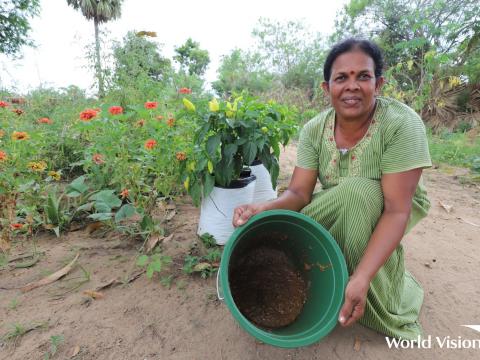Unlock rural women's potential to beat poverty

On International Day of Rural Women, Julie describes the importance and power of gender-transformative economic empowerment
- Case studies from Sri Lanka demonstrate the impact of a holistic approach of empowering individuals while tackling negative gendered norms
- The uptake of income generation activities are extremely successful when they are made possible for women, who juggle multiple responsibilities and face acute time poverty
Julie Byun, Technical Advisor – Livelihoods
Rural women make up a quarter of the world’s population, and the role they play in food systems, poverty reduction, climate resilience and the overall well-being of rural families are so crucial that the world celebrates their contribution every October 15th, the International Day of Rural Women.
However, the day is also a stark reminder of the work that still needs to be done to address gender-based discrimination and structural barriers that prevent rural women from achieving their full potential. Women typically work 13 hours per week longer than men in agriculture[1], the gender pay gap in rural areas are as high as 40% and less than 20% of women worldwide are landholders.[2]
As a community-led, child-focused organisation, World Vision has a long history of working with rural women and has observed first-hand the multiple burdens that these women face on a daily basis.

World Vision’s experience in Sri Lanka: there are ways to transform expectations around women's roles
In the communities with whom World Vision works in the Northern and Eastern provinces of Sri Lanka, women face severe time poverty because they are active in agricultural value chains--through work such as planting, weeding and harvesting-- while at the same time are responsible for nurturing their land and livestock, and feeding and caring for the family.
The stereotypical gender roles, which emphasise women's caregiving responsibilities, limit their engagement in the formal labour markets while negative gender norms that deem women as incapable of fulfilling higher-value activities, such as processing or marketing, confine women to certain agricultural activities and sectors.
Based on World Vision's experience of implementing a series of gender-transformative economic development projects in the last decade, we have found that a holistic approach of empowering individuals within the current socially acceptable boundaries while actively challenging the systemic, structural barriers at the same time, has been largely effective.
Empowerment within acceptable boundaries: When feasible and profitable opportunities are presented, women will seize them and grow
Through multiple assessments (such as gender-sensitive value chain analysis, rapid care analysis and social-norm assessments) World Vision identified value-chains that are not only profitable but also feasible for women to participate in parallel with their current domestic and childcare responsibilities.

These include the groundnut, mushrooms and manioc value chains, which were selected as part of the Gender and Disability Inclusive Economic Development Project (2016-2021), because they are less labour intensive and time consuming, yet at the same time, presented opportunities to showcase women’s ability to lead stages of the value-chain believed to be unfit for women.
When the value chain activities were introduced to farmers, both male and female, it was found that the adoption rate of production techniques were higher among female producers (92%) compared to the male producers (89%). Furthermore, participation in collective buying and selling were the highest in female-headed households, more than double the participation rate of non-poor, male-headed households.[3]
Similarly, in the Natural Farming project (2013-2021), which introduced a holistic agroecological farming system that require less labour compared to conventional farming, women conducted up to 98% of all value chain activities and regularly practiced trained techniques, such as preparing organic compost and bio-pesticides.[4]

Challenging negative norms: Systemic, structural transformation require the engagement of both the men and the wider community
World Vision also actively challenged negative gender norms and unequal power relations by working directly with men and couples participating in the project to encourage shared responsibility and decision-making in the household, as well as with the community as a whole by promoting discussions with the objective of attitudinal change.
These holistic approaches have been shown to be successful in the Gender and Disability Inclusive Economic Development Project, leading to the percentage of men that reported to be involved in daily childcare and unpaid housework to double, and the hours spent daily by women on income-generating activities increasing 150% from 2.3 hours a day at baseline to 5.8 hours a day between baseline and endline of the project.[5] The project also observed a notable change in women’s decision-making power over productive inputs, activities and household expenditure.
As so many of World Vision’s staff are local, our staff can work closely with rural women to better understand their lived-experience and to partner with them in implementing workable evidence-based solutions. It also means we know for sure that rural women are key drivers to many solutions for some of the most important problems that the world is facing and that it is in everyone’s best interest to partner with them to help them unlock their full potential.
_______________
Julie Byun is a technical advisor for World Vision’s livelihood’s programme, specialising in the Ultra-Poor Graduation approach, Monitoring and Evaluations and Gender Equality and Social Inclusion. She has worked for World Vision in Korea, Bangladesh and Vietnam and is now based in the UK.
Footnotes
1. https://www.fao.org/news/story/en/item/460267/icode/
2. https://www.ilo.org/wcmsp5/groups/public/---ed_protect/---protrav/---ilo_aids/documents/publication/wcms_619691.pdf
3. Gender and Disability Inclusive Economic Development Project Endline Report, 2021
4. Natural Farming Project Phase I Evaluation Report, 2015
5. Gender and Disability Inclusive Economic Development Project Endline Report, 2021